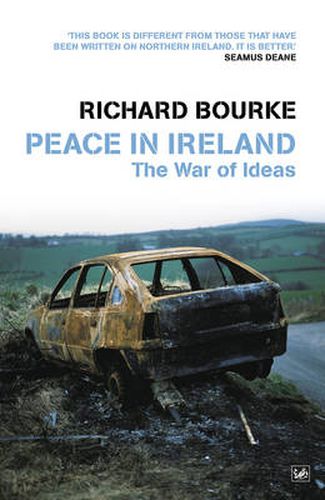Readings Newsletter
Become a Readings Member to make your shopping experience even easier.
Sign in or sign up for free!
You’re not far away from qualifying for FREE standard shipping within Australia
You’ve qualified for FREE standard shipping within Australia
The cart is loading…






A second editon of Richard Bourke’s classic study of the Northern Ireland Troubles, includes a new preface.
Peace in Ireland is a classic study of the Northern Ireland Troubles which examines the events of 1968-2003 in broad historical perspective, including an exploration of the ideological roots of the conflict in the late nineteenth and early twentieth centuries. It covers the decisive episodes that marked the trajectory of the Troubles, from the Civil Rights Movement, Bloody Sunday and the Sunningdale Agreement, to the hunger strikes, the paramilitary ceasefires and the Good Friday Agreement.The book exposes the assumption that the conflict was a product of imperialism, and challenges the idea that the descent into violence was brought about by atavistic regression or ethnic solidarity. Its central argument is that the Northern Ireland debacle was a distinctly modern conflict, fought over rival aspirations to popular sovereignty. Accordingly, the book places opposing conceptions of democratic legitimacy at the centre of the dispute. From this angle, it analyses both Nationalism and Republicanism as well as Unionism and Loyalism with the aim of providing a sustained investigation of the impact of political ideas on modern Ireland.
$9.00 standard shipping within Australia
FREE standard shipping within Australia for orders over $100.00
Express & International shipping calculated at checkout
A second editon of Richard Bourke’s classic study of the Northern Ireland Troubles, includes a new preface.
Peace in Ireland is a classic study of the Northern Ireland Troubles which examines the events of 1968-2003 in broad historical perspective, including an exploration of the ideological roots of the conflict in the late nineteenth and early twentieth centuries. It covers the decisive episodes that marked the trajectory of the Troubles, from the Civil Rights Movement, Bloody Sunday and the Sunningdale Agreement, to the hunger strikes, the paramilitary ceasefires and the Good Friday Agreement.The book exposes the assumption that the conflict was a product of imperialism, and challenges the idea that the descent into violence was brought about by atavistic regression or ethnic solidarity. Its central argument is that the Northern Ireland debacle was a distinctly modern conflict, fought over rival aspirations to popular sovereignty. Accordingly, the book places opposing conceptions of democratic legitimacy at the centre of the dispute. From this angle, it analyses both Nationalism and Republicanism as well as Unionism and Loyalism with the aim of providing a sustained investigation of the impact of political ideas on modern Ireland.